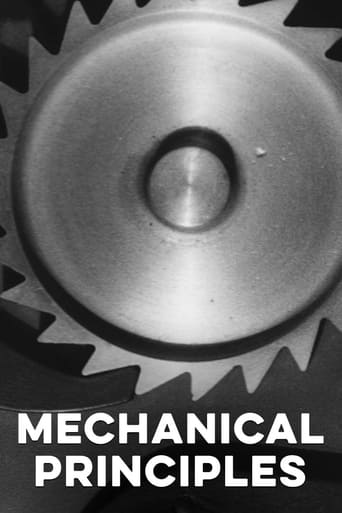SpuffyWeb
Sadly Over-hyped
Exoticalot
People are voting emotionally.
Spoonixel
Amateur movie with Big budget
Quiet Muffin
This movie tries so hard to be funny, yet it falls flat every time. Just another example of recycled ideas repackaged with women in an attempt to appeal to a certain audience.
veronikastehr
Working of machine resulted here due to the ''clarity'' of choice of motifs and photographs in an abstract contemplation about energy and eternal cosmic circular change. Painstakingly elaborated compositions of each shot stimulate the viewer to perceive the exactness according to which function various parts of every machine speaking at the same time about the way how the director Ralph Steiner works – avant-garde filmmaker active in the early 20th century. The same as in the working of machine, in this film Steiner left no room for improvisation. It is however interesting that the work as a whole looses the harshness of cold mathematical approach and gives the effect of visual poetic dedicated to the epoch of machines – constructed mechanisms that produce energy, invisible omnipresent power.
bob the moo
I was fortunate enough to get some time recently to visit MoMA during a work trip where I diverted into a few days in Manhattan. In one of the rooms was a series of works which drew on mechanical engineering and design, whether it be drawings or short films like this one from the silent era. As others have said here this is a very simple film in some ways because for 10 minutes we are shown a series of gears working together. We don't see the bigger picture of the machine they are part of, because the camera focuses very much on the individual sets of teeth and cogs moving in their set rotation. We maybe have 20 seconds or so on each one, so over 10 minutes you see a lot.It is a very simple film but I found it hypnotic and very satisfying. I'm not a practical man so I appreciate the engineering behind making things work and the gear mechanisms here are beautiful. Some of them are very complex with variety of teeth and shapes of the cogs while others are very traditional, two round cogs with interlocking teeth – simple but still beautiful in their precision as they fit together. Maybe it doesn't work as well on Youtube as it does in the quiet dark space of a gallery, but for me I really loved this. That said 10 minutes was probably enough and it wasn't perfect – the proximity of the camera to some of the mechanisms occasionally meant it was hard to see what was occurring, but for the most part the approach is simple and the camera allows enough view and enough time to appreciate the mechanical beauty of each repeating pattern of operation – precise and perfect.
MartinHafer
This film is from disc 7 of the collection entitled "Unseen Cinema: Early American Avant-Garde Film 1894-1941". It's a very esoteric collection of mostly art films and films of historical interest from the early days of film. It is NOT the sort of collection that the average person would consider even watching--which, I guess, makes me a weird guy.The film consists of cross-sections of various rotary and piston engines at work. The shots are all closeups and are set to music that seems quite fitting to the slow-speed action. It's all a bit hypnotic (or boring depending on your perspective) but certainly NOT a film that most folks would rush out to see. As it really defies my ability to give the film a numerical score, I'll just say that it was different...
Michael_Elliott
Mechanical Principles (1930)*** (out of 4) Imaginative short from Ralph Steiner is a 100% visual feast as we see close up shots of pendulums swaying, pistons going up and down or side to side and various other mechanical operations. This is just one of many shorts including on the UNSEEN CINEMA set, which also shows up on Turner Classic Movies ever so often. This is a pretty entertaining set of avant garde films and this one here contains some of the most imagination. I will admit that at 10-minutes I began to feel a bit drained towards the end but there's no question that the director put a lot of thought into the final product. I find that many avant garde films just try to show random images in a variety of ways just so the finished product can have some sort of strange or weird feel to it. That certainly happens here but the exception is that every shot seems to have been well thought out and placed in an order that makes the film run smoothly and not once do we just feel like we're seeing stuff pieced together without any thought. This is where the imagination comes from and what makes the film really set itself apart from others like it. Some reviewers have mentioned the possible influence on Chaplin's MODERN TIMES and that's certainly possible.

